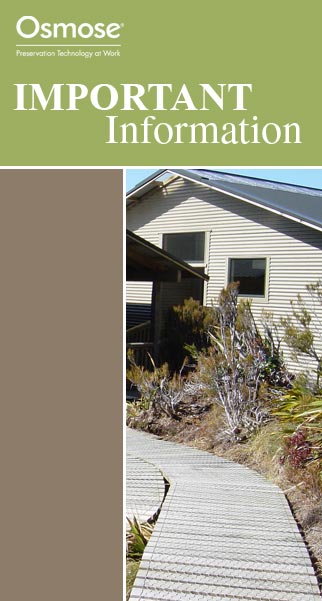

Protim® LOSP H3
1. Do not burn preserved wood.
2. Wear dust mask & goggles when cutting or sanding wood.
3. Wear gloves when working with wood.
4. Some preservative may migrate from the treated wood into soil/water or may dislodge from the treated wood surface upon contact with skin. Wash exposed skin areas thoroughly.
5. All sawdust and construction debris should be cleaned up and disposed of after construction.
6. Wash work clothes separately from other household clothing before re-use.
7. Preserved wood should not be used where it may come into direct or indirect contact with drinking water, except for uses involving incidental contact such as fresh water docks and bridges.
8. Do not use preserved wood under circumstances where the preservative may become a component of food, animal feed or beehives.
9. Do not use preserved wood as mulch.
10. Only preserved wood that is visibly clean and free of surface residue should be used.
11. Do not use preserved wood in direct contact with aluminum.
12. If the wood is to be used in an interior application and becomes wet during construction, it should be allowed to dry before being covered or enclosed.
13. Disposal Recommendations: Preserved wood may be disposed of in landfills or burned in commercial or industrial incinerators or boilers in accordance with federal, state and local regulations.
14. If you desire to apply a paint, stain, clear water repellent or other finish to your preservative treated wood, we recommend following the manufacturer’s instructions and label of the finishing product. Before you start, we recommend you apply the finishing product to a small exposed test area before finishing the entire project to insure it provides the intended result before proceeding.
15. Mould growth can and does occur on the surface of many products, including untreated and treated wood, during prolonged surface exposure to excessive moisture conditions. To remove mould from the treated wood surface, wood should be allowed to dry. Typically, mild soap and water can be used to remove remaining surface mould. For more information visit www.epa.gov.
16. For more information visit www.osmose.com.au / www.osmose.co.nz.
Download Brochure








